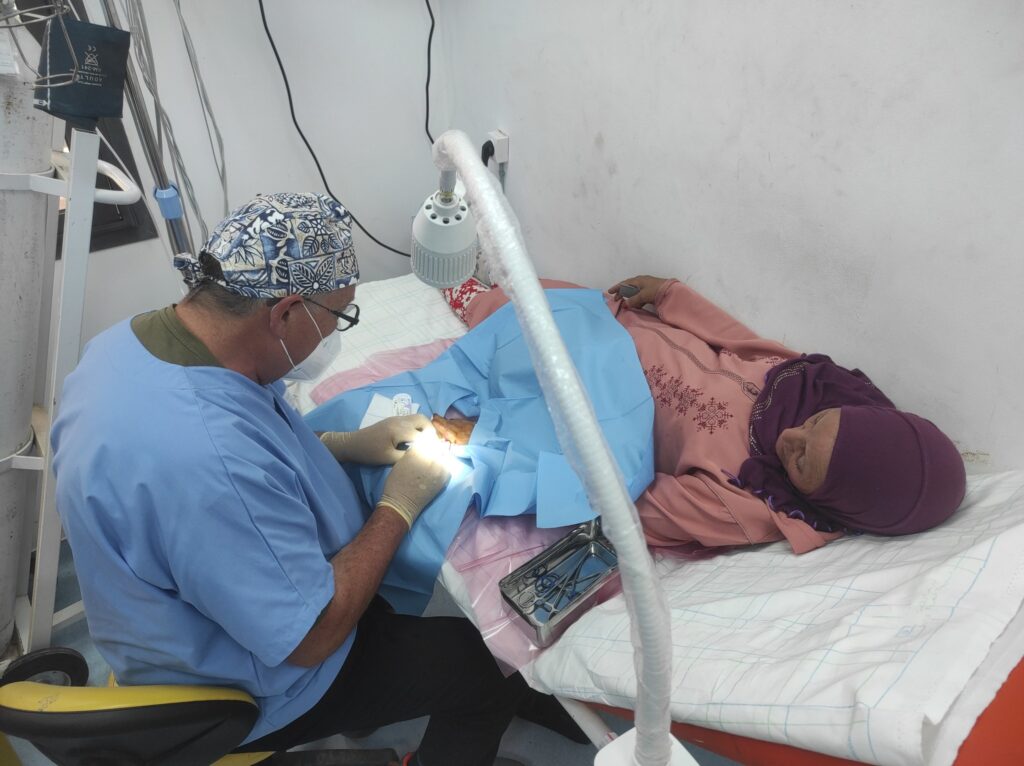Deep in the High Atlas Mountains of Morocco lies the beautiful valley of Aït Bouguemez, often called “The Happy Valley” for its breathtaking landscapes and warm community spirit. Yet, behind the postcard beauty of terraced fields and snow-capped peaks, the region struggles with a harsh reality: limited access to healthcare.
The nearest regional hospital is located many kilometers away in Azilal, requiring hours of travel along winding, often dangerous mountain roads. During winter, heavy snow and rain can block access entirely. For many families, reaching a doctor is not just inconvenient—it is often impossible.
To address this urgent need, the Aït Bouguemez Association has, for years, been organizing annual medical caravans. These caravans bring doctors, nurses, and volunteers directly to the valley, transforming schools, community halls, or even tents into temporary clinics. For thousands of residents, these caravans are nothing short of a lifeline.
Bringing Healthcare to the Mountains
The caravans are designed to bring healthcare directly to those who need it most. Each year, dozens of medical professionals volunteer their time and expertise, often traveling from cities like Marrakech, Casablanca, and Rabat—and sometimes even from abroad.
For the people of Aït Bouguemez, who may go months or years without a medical consultation, the arrival of the caravan is eagerly awaited. Entire families walk long distances from nearby villages to benefit from services that would otherwise remain out of reach.
The setting is often modest—classrooms converted into examination rooms, village squares turned into pharmacies—but the impact is profound.
Comprehensive Health Services
One of the strengths of the caravans lies in the variety of services they provide. Rather than focusing on a single specialty, the caravans bring together a diverse team capable of addressing multiple health needs in the community.
Services typically include:
- General Medicine: diagnosis and treatment of common illnesses such as respiratory infections, digestive issues, and joint pain.
- Pediatrics: monitoring child growth, vaccinations, and treatment of frequent childhood illnesses.
- Gynecology & Obstetrics: prenatal care, maternal health check-ups, and guidance for women who often lack regular medical support.
- Ophthalmology: vision testing, screening for cataracts and other eye conditions, and distribution of corrective glasses.
- Cardiology & Internal Medicine: blood pressure monitoring, heart health assessments, and diabetes screening.
- Pharmaceutical Distribution: essential medicines provided free of charge, ensuring patients do not leave empty-handed.
- Health Education: interactive sessions on nutrition, hygiene, reproductive health, and chronic disease prevention.
Impact on the Community
The importance of these caravans cannot be overstated. For many families, they represent the only opportunity in an entire year to see a doctor.
- Children: gain access to critical vaccinations, growth monitoring, and treatment for malnutrition or infections.
- Pregnant Women: receive check-ups that can prevent complications during pregnancy and childbirth.
- Elderly Residents: benefit from screenings for chronic conditions such as hypertension, diabetes, and arthritis, which often go untreated.
In addition to direct treatment, the caravans also restore hope and dignity. Knowing that doctors and volunteers care enough to travel to their remote villages reassures residents that they are not forgotten. This psychological and emotional impact is just as valuable as the medical services themselves.
f times each year, highlight the life-changing role of the caravans.
Challenges Faced
While successful, the caravans also face significant challenges:
- Logistics: transporting medical equipment, supplies, and medicines across mountain roads is complex and costly.
- Climate: harsh winters and sudden weather changes can delay or even cancel missions.
- Limited Resources: the number of doctors and the amount of medicine available is never enough to cover the needs of the entire population.
- Follow-up Care: once the caravan leaves, patients often lack access to continued treatment, underscoring the need for a permanent medical facility in the valley.
A Model of Solidarity
Despite these challenges, the caravans continue to operate thanks to the spirit of solidarity. Local villagers host and assist the medical teams, providing food, shelter, and logistical support. National NGOs, international partners, and individual donors contribute financially and materially.
This model of partnership demonstrates that when communities and organizations unite, even the most isolated valleys can benefit from quality healthcare.
The Future: From Caravans to Permanent Care
While annual caravans bring critical relief, the long-term vision of the Aït Bouguemez Association is to establish a permanent Medical Caravans Center in the village of Ifrane, Aït Bouguemez.
This center, currently under construction, will serve as:
- A permanent base for visiting doctors and medical caravans.
- A safe and equipped space for regular health check-ups, screenings, and emergency services.
- A hub for training and prevention, where the community can learn about hygiene, nutrition, and chronic disease management.
The existence of such a center will not replace the caravans but will strengthen and complement them, ensuring follow-up care and continuous medical presence in the valley.
Conclusion
The annual medical caravans of the Aït Bouguemez Association are much more than temporary clinics—they are a lifeline for thousands of people in Morocco’s High Atlas. They bring not only medicine and treatment but also solidarity, hope, and dignity.
As the valley awaits the completion of its Medical Caravans Center, these caravans remain a powerful example of what community-driven initiatives, supported by national and international solidarity, can achieve.
They remind us of a simple yet profound truth: healthcare is a right, not a privilege—and even in the most remote mountains, it should be accessible to all.


